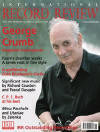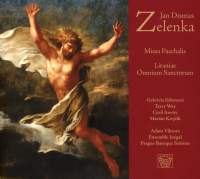Texte paru dans: / Appeared in: |
|
|
Reviewer: Christopher
Price Very soon after Jan Dismas Zelenka arrived in Dresden in 1710 or 1711, a mere bass player in the Saxon court's growing and increasingly renowned orchestra, he started seeking attention by composing for the court's Catholic church services. By the mid‑1720s, he was being called on more and more to take on the direction of music for the liturgy in place of the Court Chapel Master, Johann David Heinichen, who eventually died of tuberculosis in 1729. By the beginning of 1726, he had already written six richly imaginative Mass settings for Dresden, as well as a number of smaller sacred works. The Zelenka scholar Janice Stockigt, who provides the informative notes for this disc's programme, believes that it was probably in that year, when he produced the Missa Paschalis and also started keeping a list of his compositions, that Zelenka started seriously seeking an official appointment to replace the now largely incapacitated Heinichen. The Missa Paschalis is a comparatively economical (for Zelenka) solemn setting of the Mass: it lasts only 37 minutes and only one movement (and what a glorious one, about which more later) is longer than three minutes. Four trumpets and timpani impart an especially festive mood to this brilliant display of Dresden's liturgical splendour. Pre‑dating the splashy arrival from Italy in 1731 of the fashionable young opera composer Johann Adolf Hasse, who returned two years later as Church Music Director, it is not yet marked by Zelenka's studiously acquired command of the Italian (more specifically Neapolitan) style that quickly came to dominate Dresden. It does display, however, the enduring mannerisms that marked Zelenka's style, the so‑called 'zelenkisms', including angular vocal and orchestral lines, quirky rhythms and surprising harmonic twists. Nine years later, when Zelenka wrote his Litaniae Omnium Sanctorum for the court's prayers for the successful delivery of the Saxon Elector's once again pregnant Habsburg wife, Maria Josepha, his musical style had bloomed. Dr Stockigt refers to the prominent new Italian galant features such as triple metres, varied articulations, extreme dynamic shifts and more florid ornamentation of vocal and instrumental lines. Even more remarkable is the amalgamation of these elements with some of Zelenka's densest and showiest counterpoint. The opening 'Kyrie eleison' features a massive double fugue, which is repeated in the concluding 'Agnus Dei'. Elaborate counterpoint also enriches several of the six sections in between. Most remarkable of all, however, is the fact that Zelenka created so interesting a work out of so unpromising a text as a litany (the longest part comprising several lists of saint's names ‑ 47 individuals and several groups ‑ followed by 'pray for us'). A high point of the disc is the tender 'Benedictus', the longest movement of the mass, which is for solo soprano and strings. Castrato sopranos were included in the troupe of Italian singers hired in 1730 to revive the Dresden opera and they sang in the church on most important feasts. Before this, while Zelenka would have resorted to the countertenors of the Hofkapelle for his altos, it is unclear who would have sung this glorious soprano solo. Possibly, since it is not unduly acrobatic, it was an exceptional boy singer from the Dresden Jesuits' Kapellknaben ensemble. On this recording, Adam Viktora's wife, the partly Englisli‑trained Czech soprano Gabriela Eibenová, is stunning in this movement. So too is her accompaniment of sinuously fluid violins with colla parte transverse flutes over a soft organ, cello and violone continuo. Eibenová's grace and sweetness shine throughout the Mass and Litaniae. Her contributions are almost enough by themselves to earn this disc an IRR Outstanding award. Happily, her fellow soloists are also outstanding, including another Ensemble Inégal stalwart, the bass Marián Krejčik. As customary in Viktora's Zelenka recordings, leading singers from outside the Czech Republic are included among the soloists. The Swiss‑American countertenor (and former Vienna choirboy) Terry Wey is an exceptionally gifted artist with a beautiful voice (listen to his captivating 'Christe eleison' in the Mass). So too is the French tenor Cyril Auvity, whose big solo is a bustling aria in the Litaniae (a dry list of perils, sufferings and brief invocations for divine assistance). All four singers flawlessly match the period‑instrument orchestra's rigorous adherence to eighteenth‑century performance practices, an all‑too‑rare occurrence in Baroque music recordings. They also match the orchestra's playing, which is nimble, flexible, tightly disciplined and enthusiastic. The 18‑strong choir is similarly technically and artistically accomplished, singing Zelenka's demanding music with confidence and majesty.
Thus, we have yet another
superb performance by Viktora and his choir and orchestra of music of
superior quality and beauty. So what else can be said? Well, there is one
complaint. The disc is packaged in an attractive bi‑fold cover inside which
sit the disc on one side and the booklet on the other. Unfortunately, the
weight of the booklet's generous 46 pages causes it to tear out of its
cover, which is glued in place by its back, unless handled with extreme
care. Still, this can hardly dim the success of this
outstanding recording. |
|
|
|
|
|
Cliquez l'un ou l'autre
bouton pour découvrir bien d'autres critiques de CD |
|




